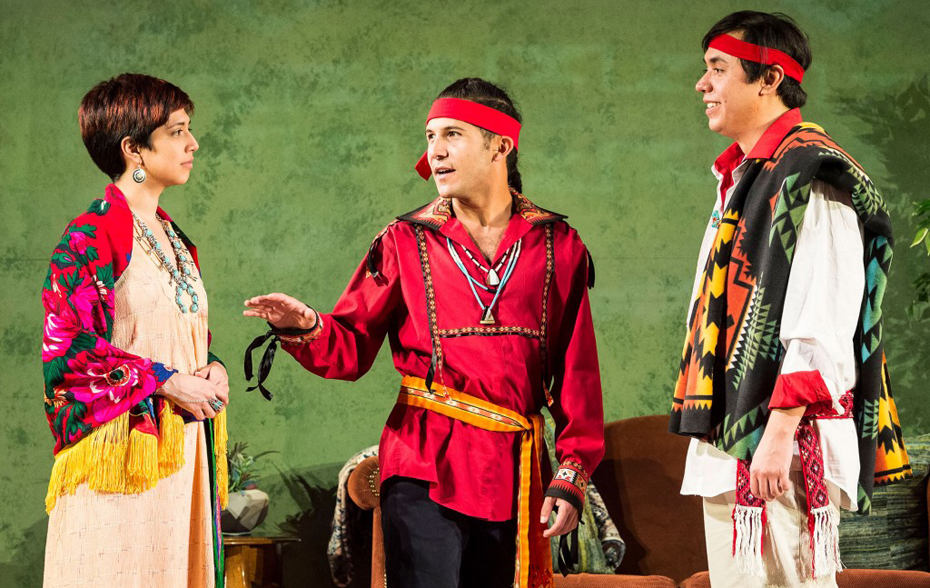
LOS ANGELES—Native Voices is a theatre program housed at the Autry Museum of the American West in this city’s huge Griffith Park. For years it has offered plays of, by and in part for Native people—I say “in part” because these stories are also available for the whole community to attend, to ponder, and learn from. I have had the pleasure of reviewing several of its productions in the past.
This season’s offering was Bingo Hall, by the young Dillon Chitto (Mississippi Choctaw, Laguna, Isleta Pueblo). He describes himself as a “Native American millennial.” Chitto grew up in Santa Fe, New Mexico, and now lives in Chicago.
Some autobiographical elements have certainly crept into Bingo Hall, which takes place over the course of several weeks in spring “in a small Pueblo village in New Mexico.” It focuses on three teenagers growing up on tribal land, examining their complex relationships to home, family, and Native tradition, and thinking about their futures.
These three are the protagonist, Edward (Eddie) Anaya (Kholan Studi, Cherokee Nation of Oklahoma), son of the elected governor of the pueblo and waiting to receive his college acceptance letters; his friend Raleigh (Ray) Rodriguez (Kenny Ramos, Barona Band of Mission Indians—Diegueño Iipay/Kumeyaay), a basketball player who is committed to staying close to home and attending the state college; and Dakota Zuni (Michaela Escarcega (Azteca-Rarémuri, Totonac), who is going off to a college in Oregon to pursue a medical career.
In stark terms, as they see it, the decision comes down to this: Leave the pueblo (and forget your people), or stay home (and be a failure).
The rest of the eight-person cast include parents, “aunties,” and the elder of the pueblo, Mrs. Zuni.
The decisions these teenagers make today—which are partially influenced by the love rivalry between the two boys over Dakota—will affect the entirety of their lives going forward. If they leave, perhaps one day the fact of having been born and raised in a certain tribe on a reservation may become almost as incidental to an adult identity as for some of the friends and colleagues they will encounter who were raised Italian Catholic or Orthodox Jewish and who left the faith. America is full of people with at best vestigial connections to their roots.
According to the National Congress of American Indians, as cited in the program, demographically Indigenous Americans constitute 0.9 percent of the U.S. population (which I assume discounts several times that many others of mixed background whose Indigenous origins are partial and who do not primarily identify with their tribal nation). From that perspective these teenage decisions may have existential reverberations for the communities in which they were raised.
The playwright, however, stacks the deck for us in that he does not paint that bright a picture of remaining on the reservation as a wise and fulfilling choice. Where are the opportunities for education, advancement, and professional achievement? Of course, some will disparage all that upward mobility talk to fall back on tradition and culture, but realistically, those are not sufficiently developed as economic models to adequately sustain whole Indigenous populations in the America of today.
The author’s very title, bringing attention to the pueblo’s senior center and its primary activity, seems to point toward the argument to leave if the future of aging in this community is going to be about little more than bleak cycles of time-killing bingo. Eddie’s father, Joe Anaya (Duane Minard, Yurok, Paiute) is running for re-election as pueblo governor, but his campaign slogan for cultural preservation, which includes expanded senior services, does not particularly inspire with any specific improvements or programs that would make aging in place a truly golden time of life. His opponent Norman—not a character in the play—proposes to start up a radio station in the pueblo, which actually sounds a little more forward-looking and youth-oriented.
Bingo Hall assumes the normality of middle-class home life, without indicating what people do to earn a living, and without so much as a nod toward the well-known endemic problems of life on the reservation—poverty, unemployment, addiction, suicide, poor medical care. At the same time, the title of the play would also seem to point to one vision of the future in the ubiquitous gaming industry that has quite dramatically rescued many tribes around the country from destitution, although at a cost which few people seem to be looking at very closely. Yet there is no reference to these larger phenomena.
Nor is there anything of substance said of the specifically Pueblo culture or of the surrounding state of New Mexico, by some measures the poorest state in the nation, with its unique character, politics and issues. As such the play has a kind of generic quality that leaves the focus squarely on the three teenagers; however, their story is very broadly the story of all young people today.
Eddie has a sister and a brother, who do not appear in the play but are only referred to, and they’re both away. Woven throughout the two acts is a long Thunderbird story, which each of the characters takes a part in relating. It’s a creation myth (particular to the Pueblo people or is this also more generic?). It has to do with two brothers and a sister, echoing both Eddie’s family and the three teenagers of the play. But I could not see how or if the playwright intended any parallel to the teenagers; it would be a very loosely imagined metaphor at best.
The recounting of this story occupies some 15 to 20 percent of the play’s running time. Without in any way meaning to diminish the story itself, or the value of keeping such legends alive, perhaps even as a theme of this play, still, from a strictly dramatic point of view, it seemed like a long, complicated saga not understandably integrated into the story and without a payoff. If it meant to say that everyone in the community shared the foundational grounding of this story for their lives and in some ways drew inspiration and guidance from it, that might be one legitimate defense for its inclusion, but do we ever see that the story does in fact provide such spiritual sustenance?
Ray, who intends to stay close to home, is the character to whom Chitto has assigned the role of culture preservation and challenging others to “decolonize” themselves. But he is also portrayed as an intellectual lightweight uninterested in studies—again, not a convincing person to offer an equally persuasive case for the politics of staying.
LaVonne Rae Andrews (Tlingit-Raven Clan) takes on the role of Mrs. Zuni, who has her moments of wise humor (“The only thing that goes with the flow are dead fish”) but is otherwise doddering and forgetful—again, not an especially optimistic portrayal of aging in place.
Other characters in the pueblo include Beverly (Jennifer Bobiwash, Ojibway), Donna Anaya (Rainy Fields, Muskogee Creek, Cherokee), and Teresa (Allison Hudson Hicks, Prairie Band Potawatomi, Choctaw).
The millennial Chitto’s stance comes through clearly to an audience, even if he ostensibly intended to offer a more balanced choice between two viable alternatives.
The writing is somewhat stiff, and the delivery, directed by Jon Lawrence Rivera, cannot overcome it. The issues Chitto seeks to raise are vital ones, but despite some fine details in the production, such as the excellent lighting design by Carla Linton, precious time is spent on material that goes nowhere, while much else goes unexplored.
Bingo Hall ran March 9-25; I was unable to get to it any sooner than the March 24th performance.












Comments